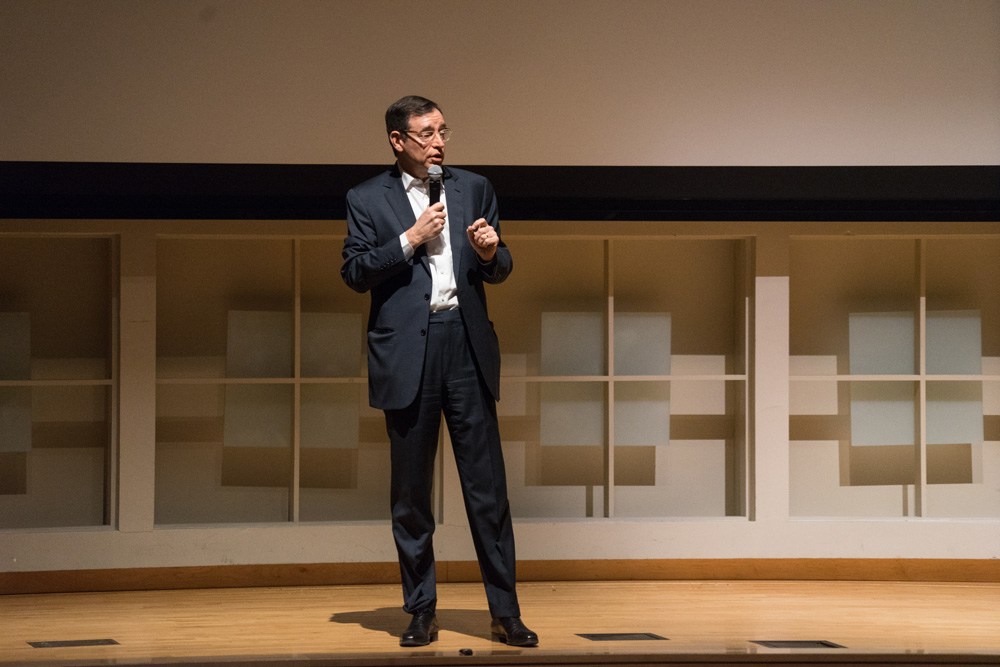
The world may be close to experiencing a global water crisis. More than seven billion gallons of water are wasted a day in the United States alone. This month, Cornell hosted a lecture featuring Seth Siegel, entitled “A Global Water Crisis Is Coming: What Can We Do To Avoid It?” Seth is an alumnus of both ILR ‘74 and the Law School ‘78, and is the author of New York Times bestseller Let There Be Water. The event was sponsored by CAMERA-supported group Cornellians For Israel, CAMERA, ZOA, Cornell’s Near Eastern Studies Department, Hillel and Chabad. 200 people came out to hear Siegel address the global water crisis.
In his book, Siegel writes about Israel’s enormous success in the water conservation industry, and how countries from around the world can adapt techniques to restructure their water maintenance infrastructure. For example, Israel has been successful in treating ninety-five percent of its sewage and redirecting it towards agricultural purposes such as watering crops and increasing the water volume of rivers. Desalination plants throughout Israel purify millions of gallons a day. The world’s largest desalination plant is located in Israel, and produces 165 millions of gallons of fresh water per day. In contrast, the U.S. reuses less than ten percent of its overall wastewater. These techniques can have a substantial effect in developing countries without great water supply, to help sustain life in those countries.

Another useful way Israel is assisting with the global water crisis is through one of its state departments, MASHAV. This department sends Israeli agricultural specialists into over one hundred developing countries, of which twenty-nine are in Africa. These professionals train locals on the ground to utilize techniques such as irrigation and water management. Places like China, Jordan, and even California have learned from Israeli water professionals on how to implement these innovative desalination techniques.
These water relationships have extended to India. In the years following India’s establishment, the country refused to have any sort of diplomatic ties with Israel and was a leader in the anti-Western Non-Aligned Movement, a movement which historically has been at odds with Israel. However, in 1992, diplomatic relations were established, and in 1994, India partnered with TAHAL, an Israeli water company, to redesign its water and sewage systems. Among other things, a water desalination plant was built, producing 106 million gallons a day. Although their interests within the UN do not always line up, Israel and India continue to work together to improve Indian water systems. In 2013, along with other water companies, TAHAL entered an agreement to help build additional water infrastructure in two neighborhoods Delhi. There is hope that in the future, if this project is a success, it will extend to other parts of Delhi, and perhaps other cities in India.
In his lecture, Seth Siegel referred to Israel being a world leader in water conservation. The facts in “Let There Be Water” not only illustrate this truth, but also reflect Israel’s dedication to conserving water globally. Through the newly created relationship between Cornell and the Technion Institute, as well as our internationally recognized agricultural school, there is a tremendous opportunity for both entrepreneurial and agricultural students to be at the forefront of innovation in the Agri-Tech industry. Even within the local community of Ithaca, which just experienced a drought, techniques for water conservation can be adopted.
Perhaps, as Seth Siegel remarked to one student in the audience, we really can change the world.
Contributed by Cornell University CAMERA Fellow Josh Elkouby, treasurer of CAMERA-supported group Cornellians for Israel (CFI).

